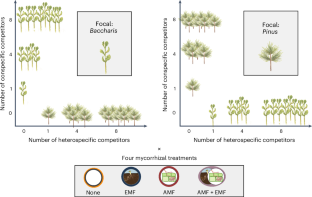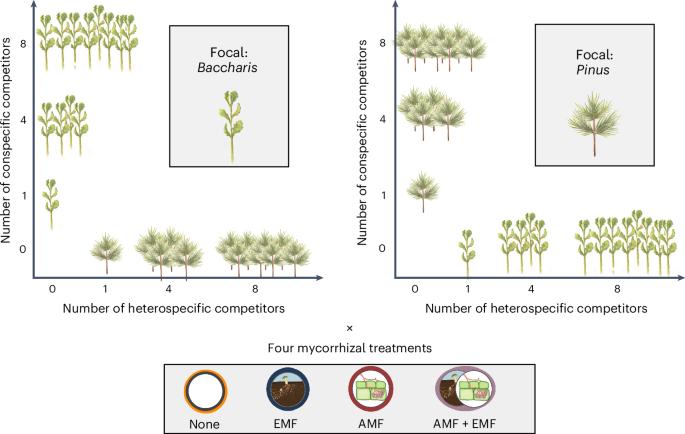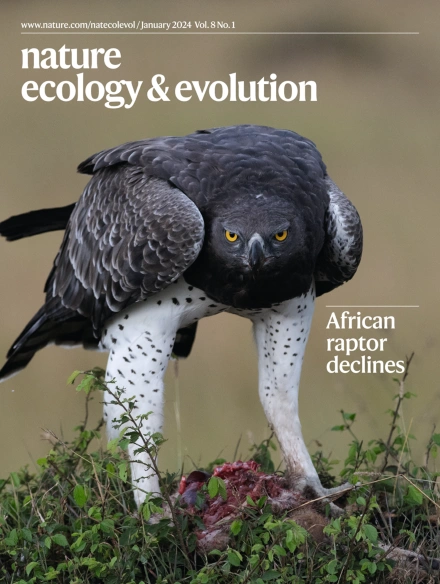Arbuscular mycorrhizal fungi equalize differences in plant fitness and facilitate plant species coexistence through niche differentiation
IF 13.9
1区 生物学
Q1 ECOLOGY
引用次数: 0
Abstract
Mycorrhizal fungi are essential to the establishment of the vast majority of plant species but are often conceptualized with contradictory roles in plant community assembly. On the one hand, host-specific mycorrhizal fungi may allow a plant to be competitively dominant by enhancing growth. On the other hand, host-specific mycorrhizal fungi with different functional capabilities may increase nutrient niche partitioning, allowing plant species to coexist. Here, to resolve the balance of these two contradictory forces, we used a controlled greenhouse study to manipulate the presence of two main types of mycorrhizal fungus, ectomycorrhizal fungi and arbuscular mycorrhizal fungi, and used a range of conspecific and heterospecific competitor densities to investigate the role of mycorrhizal fungi in plant competition and coexistence. We find that the presence of arbuscular mycorrhizal fungi equalizes fitness differences between plants and stabilizes competition to create conditions for host species coexistence. Our results show how below-ground mutualisms can shift outcomes of plant competition and that a holistic view of plant communities that incorporates their mycorrhizal partners is important in predicting plant community dynamics. A controlled greenhouse study that manipulated the presence of both ectomycorrhizal fungi and arbuscular mycorrhizal fungi at a range of conspecific and heterospecific plant competitor densities shows that arbuscular mycorrhizal fungi promote plant species coexistence by equalizing fitness differences and stabilizing competition.


丛枝菌根真菌通过生态位分化平衡植物适应性差异并促进植物物种共存
菌根真菌对绝大多数植物物种的生长至关重要,但在植物群落组合的概念中,菌根真菌的作用往往是相互矛盾的。一方面,寄主特异性菌根真菌可以通过促进生长使植物在竞争中处于优势地位。另一方面,具有不同功能的寄主特异性菌根真菌可能会增加养分生态位的分配,使植物物种得以共存。在这里,为了解决这两种矛盾力量的平衡问题,我们利用温室对照研究来操纵两种主要类型的菌根真菌(外生菌根真菌和丛枝菌根真菌)的存在,并利用一系列同种和异种竞争者密度来研究菌根真菌在植物竞争和共存中的作用。我们发现,丛枝菌根真菌的存在能均衡植物间的适应性差异,稳定竞争,为宿主物种共存创造条件。我们的研究结果表明,地下互生关系可以改变植物竞争的结果,而将菌根伙伴纳入植物群落的整体视角对于预测植物群落动态非常重要。
本文章由计算机程序翻译,如有差异,请以英文原文为准。
求助全文
约1分钟内获得全文
求助全文
来源期刊

Nature ecology & evolution
Agricultural and Biological Sciences-Ecology, Evolution, Behavior and Systematics
CiteScore
22.20
自引率
2.40%
发文量
282
期刊介绍:
Nature Ecology & Evolution is interested in the full spectrum of ecological and evolutionary biology, encompassing approaches at the molecular, organismal, population, community and ecosystem levels, as well as relevant parts of the social sciences. Nature Ecology & Evolution provides a place where all researchers and policymakers interested in all aspects of life's diversity can come together to learn about the most accomplished and significant advances in the field and to discuss topical issues. An online-only monthly journal, our broad scope ensures that the research published reaches the widest possible audience of scientists.
 求助内容:
求助内容: 应助结果提醒方式:
应助结果提醒方式:


